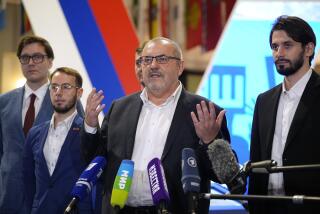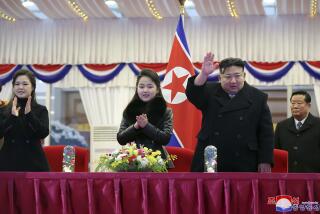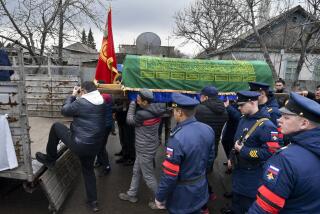Top Kazakh’s Daughter May Profit in Vote
- Share via
MOSCOW — The daughter of Kazakhstan’s president took a major step Sunday toward positioning herself as a possible successor to her father, leading a pro-government party in parliamentary elections seen as a test for the oil-rich country’s fledgling democratic institutions.
President Nursultan A. Nazarbayev, 64, who was Kazakhstan’s Communist boss in the final years of the Soviet Union, has introduced some democratic features to the Central Asian nation but still runs a largely authoritarian system. Last year’s creation of the Asar party, led by his daughter Dariga Nazarbayeva, 41, was widely seen as a step toward dynastic succession, though some say it was aimed at broadening political participation.
Casting his vote Sunday in Astana, the new capital where many government buildings are still under construction, Nazarbayev said he was confident that voters in this nation of 15 million would choose “stability.”
“Kazakh citizens will vote for this, and not for the empty promises of mountains of gold,” he said, apparently referring to opposition parties’ proposals to distribute oil revenue to citizens.
His daughter, also speaking to reporters while voting, played down her ambition for the presidency. “To talk about any candidate other than the incumbent is naive,” she said.
Nazarbayev has said he will seek another seven-year term in 2006, and many in Kazakhstan believe his daughter -- who holds enormous influence over the country’s media as head of a media conglomerate -- aims to succeed him in 2013.
“Certainly Dariga Nazarbayeva will be positioned as the president’s successor,” Asylbek Kozhakhmetov, chairman of the opposition Democratic Choice for Kazakhstan movement, said in a telephone interview. He questioned, however, whether she would ever develop enough support to win the presidency in a fair election. “If there were no Nazarbayev tomorrow, her rating would be 1%,” he said.
Partial results early today, based on a minority of votes cast by electronic balloting, showed Nazarbayev’s Otan party with 43% of the vote, Asar with 20% and Ak Zhol, the main opposition party, with 16%. The pro-government AIST bloc of the Agrarian and Civic parties had 8%, and the opposition bloc of Democratic Choice and the Communists had 6%.
At stake were 77 seats in Parliament’s lower house -- 67 were to be filled in individual districts and 10 according to the proportion of votes won by parties.
Information Minister Altynbek Sarsenbayev, co-chairman of Ak Zhol and the only opposition party member in the Cabinet, said the elections come at a critical moment.
Nazarbayev, he said, must choose “where he is going to move our country: to the side of our southern neighbors, with their authoritarianism, or to the side of Eastern Europe, where due to political and social reforms people live in much better conditions.”
Aidar Ahumabayev, a top Asar party official, said in an e-mailed response to questions Sunday that the party “was not created in order to prepare for presidential succession from father to daughter.”
“The Asar party was created by Dariga Nazarbayeva in order to support reforms, which are carried out by her father,” he said. “Dariga Nazarbayeva ... is not going to propose herself as a candidate in the forthcoming presidential elections in 2006.”
Ahumabayev said there were some genuine differences between the father’s and the daughter’s parties.
“The Otan party is mainly a party of bureaucrats and civil servants and it is typical for them to address problems ‘from above,’ whereas the Asar party is addressing the painful points and social problems ‘from below,’ taking into consideration the opinion of ordinary people,” he said.
He also said this approach had helped pressure the presidential party to do a better job. As a result, the Otan party “started to think about new schools and kindergartens, hospitals, pensioners and veterans,” he said. “Competition appeared, which in any case will only promote normal transformation of the country.”
Critics, however, said Sunday’s balloting and the campaign leading up to it were flawed.
“The real underlying problem is that the pro-government parties continue to dominate the media, they control the election commissions, and they use various resources, which are quasi-official, to coerce and manipulate voters,” Tom Bridle, director of the Kazakh branch of the Washington-based National Democratic Institute, which promotes democracy around the world, said by phone from Almaty, the former capital.
Murat Tungishbayev, director of election monitoring for the Republican Network of Independent Monitors, an organization formed by nongovernmental organizations in Kazakhstan, said the move to optional electronic voting at some polling stations had contributed to widespread confusion.
“In some precincts computers went down. The vote-count procedure is a complete mess,” he said.
Yakov Ryzhak of The Times’ Moscow Bureau contributed to this report.
More to Read
Sign up for Essential California
The most important California stories and recommendations in your inbox every morning.
You may occasionally receive promotional content from the Los Angeles Times.










